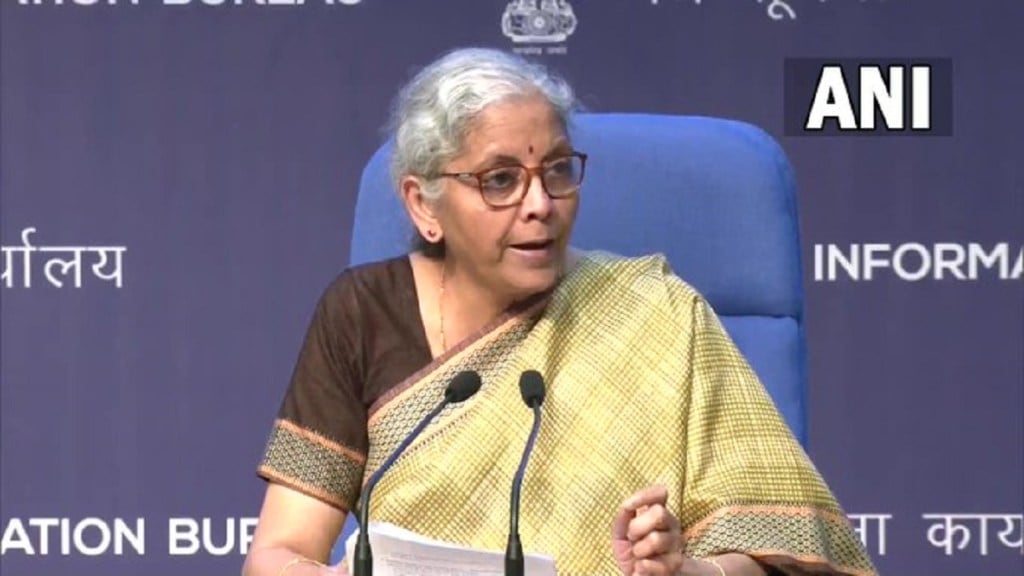The GST Council, after its 50th meeting under the chairpersonship of Finance Minister Nirmala Sitharaman, on July 11, announced several key recommendations regarding changes in GST tax rates, measures for facilitation of trade, and streamlining of compliance processes.
In terms of recommendations relating to GST rates on goods, it has been decided to reduce the rate on uncooked/unfried snack pellets from 18 per cent to 5 per cent. It also decided to exempt IGST on imported medicines and also Food for Special Medical Purposes (FSMP) used in the treatment of rare diseases listed under the National Policy for Rare Diseases, 2021. It was also decided to clarify that supply of raw cotton including kala cotton, by agriculturists to cooperatives is taxable. GST on imitation zari thread or yarn is reduced from 12 per cent to 5 per cent. The council also decided to reduce the GST rate on LD slag from 18 per cent to 5 per cent to encourage better utilisation of this product and for protection of the environment. GST rate on fish soluble paste was also reduced from 18 per cent to 5 per cent.
Further, the GST council also reduced the GST rate from 18 per cent to 5 per cent on foods served in cinema halls. “The GST Council’s decision to levy GST at 5 per cent on food and beverages supplied in cineplexes is a welcome relief to consumers and businesses alike. This is a positive development for the Indian economy, as it will boost consumer spending and encourage investment in the entertainment sector. It is also a sign that the GST Council is committed to simplifying the tax regime and making it more business-friendly,” said Saurabh Agarwal, Tax Partner, EY.
The GST Council has also recommended the rules governing appointment and conditions of President and Members of the proposed GST Appellate Tribunal for enabling smooth constitution and functioning of GST Appellate Tribunal. It also recommended that the relaxations provided in FY 2021-22 in respect of various tables of FORM GSTR-9 and FORM GSTR-9C be continued for FY 2022-23. Further, for easing compliance burden on smaller taxpayers, exemption from filing of annual return for taxpayers having aggregate annual turnover upto Rs 2 crore, to be continued for FY 2022-23 also. The council said a circular would be issued to provide clarification regarding TCS liability in cases where multiple e-commerce operators (ECOs) are involved in a single transaction of supply of goods or services or both.
Meanwhile, the GST Council also announced measures clarifying that mere holding of securities of a subsidiary company by a holding company cannot be treated as a supply of services and therefore, cannot be taxed under GST. “This will be a significant relief to the taxpayers and also will put to rest the controversy surrounding the specific entry in the Services Accounting Code 997171 which covers Services of holding equity of subsidiary companies. While this is a first one, there still remains a lot of debate and interpretational issues around the deemed supply provisions specifically for cross border transactions. Industry should continue its engagement with the policy makers on these aspects,” said Mahesh Jaising, Partner, Deloitte India.
He further explained that input service distributor is a concept borrowed from the Service Tax regime which requires input tax on common services to be distributed to different registrations of the same PAN as per the prescribed rules. “While the provision has been there since July 2017, ambiguities have been raised due to the language of the law and clarifications in early days of law about the concept being optional in nature,” he said, while adding that this will be a huge relief to the industry as a whole and lay to rest disputes around this.
The GST Council recommended notification of GST Appellate Tribunal by the Centre with effect from August 1, 2023. “It appears that the detailed road map on the operation of the GST Tribunal would be rolled out by the government in a phased manner. This significant development would reduce the burden on the High Courts and ensure that businesses can seek recourse of tribunal instead of moving to high courts,” said Saurabh Agarwal. He also welcomes the Council’s recommendation to make the Input Service Distributor (ISD) mechanism non-mandatory for distribution of input tax credit of common input services procured from third parties. “This will resolve tax disputes arising on account of cross charge vs. ISD and bring certainty to the taxation of these services. The Council has also recommended that amendments be made to make ISD mandatory prospectively, which will give businesses time to implement the change,” he said.
Earlier, according to the data released by the department, India’s GST collection surged in June, registering a 12 per cent on-year increase of Rs 1.61 lakh crore.
